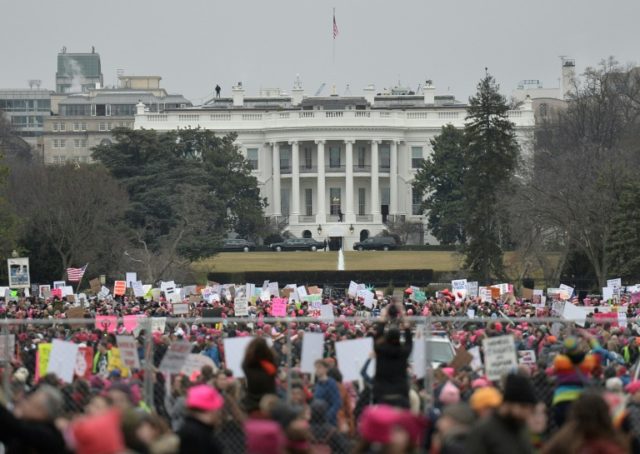New York (AFP) – Judges, mayors, comedians and activists mobilized through social media — the first 100 days of Donald Trump’s presidency has spawned a multi-faceted resistance hindering the Republican’s efforts to enact election promises.
Widespread liberal outrage at the billionaire’s election spilled over into the Women’s March, which set the tone the day after his inauguration when millions of people poured onto streets across the United States.
The first head-on collision came a week later on January 27 when the White House issued its first travel ban, suspending visa-holders from seven Muslim majority countries and Syrian refugees indefinitely.
That weekend, hundreds of travelers were blocked at airports around the world as US lawyers and the powerful American Civil Liberties Union immediately contested the legality of the order.
That scored an early victory for the opposition movement, a nebulous raft of groups largely watched rather than led by the Democratic Party. The travel ban was suspended by a George W. Bush-nominated judge in Seattle, James Robart.
The Trump administration returned with a modified ban on March 15, reducing to six the number of implicated countries and excluding those with valid visas.
Another federal judge, Derrick Watson in Hawaii, blocked it again on the grounds that it was reasonable to conclude it was intended to “disfavor a particular religion, in spite of its stated, religiously-neutral purpose.”
Yet the battle against restricting immigration goes on. Thousands of people demonstrated on behalf of immigrants in February and March on a near daily basis.
– ‘Iconic’ –
On the campaign trail, Trump promised to expel millions of illegal immigrants. Shortly after he took power, his team ordered federal agents to crack down on undocumented migrants with a criminal record.
The Democratic mayors of the country’s three largest cities, New York, Los Angeles and Chicago — Bill de Blasio, Eric Garcetti and Rahm Emanuel respectively — immediately moved to shore up their status as “sanctuary” cities for migrants.
With police chiefs by their side, they vowed to protect migrants who had not committed violent crimes while detentions of illegal immigrants sowed panic among undocumented communities.
Sam Abrams, who teaches political science at Sarah Lawrence College, said the mayors acted “in ways that they have never acted before.”
But perhaps the toughest critics are on television, late-night comedians blurring the lines between politics and entertainment, the most widely watched of which is long-running NBC weekly show “Saturday Night Live.”
Alec Baldwin’s caricature of Trump, Melissa McCarthy’s of White House spokesman Sean Spicer and the lampooning of the week’s events make regular news headlines.
“It is hard to say just how important it is, but SNL, when they pick on someone, it becomes iconic,” said Abrams. Their portrayal of one time Republican vice presidential nominee Sarah Palin had a disastrous impact on the 2008 race, he said.
– Republican rebels –
Influential TV satirists such as Stephen Colbert, John Oliver or Samantha Bee take delight in picking over the shortcomings of an administration led by a former reality TV star who owes much of his success to “The Apprentice.”
The entertainment world in general, stuffed with vocal Hillary Clinton supporters, has seen myriad celebrities willing to attack Trump in public from Meryl Streep to Michael Moore, from Bruce Springsteen to Snoop Dogg.
Then there are thousands of anonymous people taking part in the resistance, those in the “Indivisible” movement who turn up at Congressional constituency meetings to heckle lawmakers and condemn the most controversial policies.
“Many were to be expected,” says Robert Shapiro, political science professor at Columbia University. “The country has been polarized for years.”
But Democrats are not automatically picking up the mantel as defenders of the common man. According to a Washington Post-ABC News poll, Americans think the Democrats are more out of touch than either Trump or the Republicans.
And if the Democrat-leaning opposition irritates the president, a bigger threat comes from dissonant voices within Trump’s own party, namely Senators John McCain and Lindsey Graham, particularly vocal on Russian interference in the election.
“That’s very significant,” said Shapiro. So too was the failure in late March to even table a vote on repealing the Obamacare health care law in the Republican majority House — which risks eroding his support base.
“Supporters for the most part have not abandoned him, but their enthusiasm has tempered off,” said Shapiro.

COMMENTS
Please let us know if you're having issues with commenting.